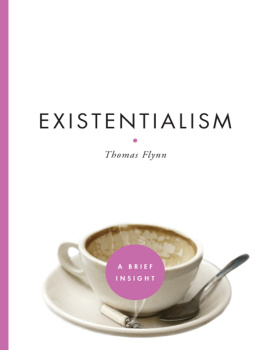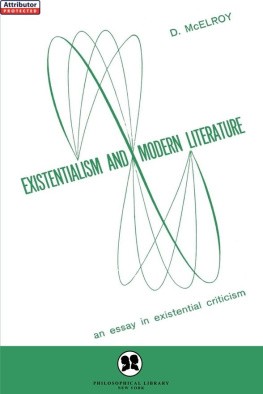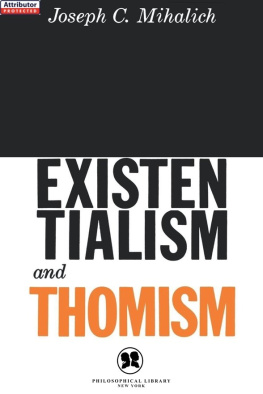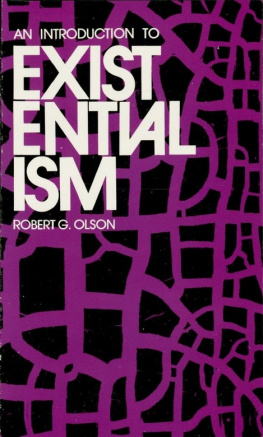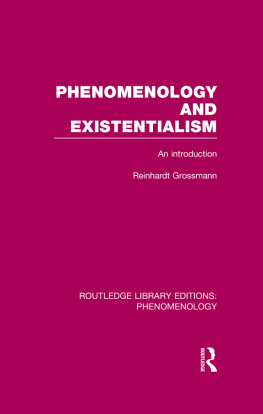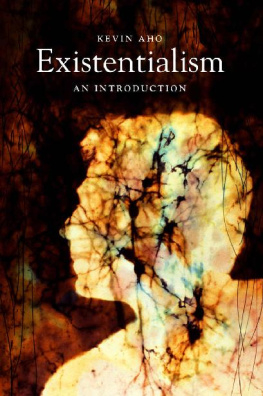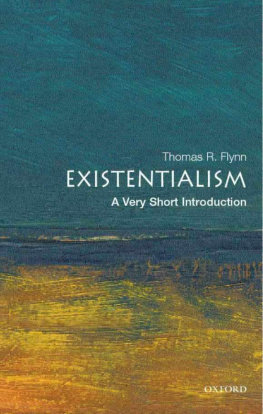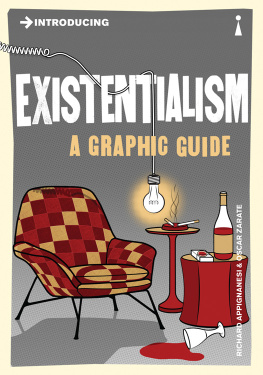Thomas Flynn - Existentialism
Here you can read online Thomas Flynn - Existentialism full text of the book (entire story) in english for free. Download pdf and epub, get meaning, cover and reviews about this ebook. year: 2010, publisher: Sterling, genre: Religion. Description of the work, (preface) as well as reviews are available. Best literature library LitArk.com created for fans of good reading and offers a wide selection of genres:
Romance novel
Science fiction
Adventure
Detective
Science
History
Home and family
Prose
Art
Politics
Computer
Non-fiction
Religion
Business
Children
Humor
Choose a favorite category and find really read worthwhile books. Enjoy immersion in the world of imagination, feel the emotions of the characters or learn something new for yourself, make an fascinating discovery.
- Book:Existentialism
- Author:
- Publisher:Sterling
- Genre:
- Year:2010
- Rating:5 / 5
- Favourites:Add to favourites
- Your mark:
- 100
- 1
- 2
- 3
- 4
- 5
Existentialism: summary, description and annotation
We offer to read an annotation, description, summary or preface (depends on what the author of the book "Existentialism" wrote himself). If you haven't found the necessary information about the book — write in the comments, we will try to find it.
Existentialism — read online for free the complete book (whole text) full work
Below is the text of the book, divided by pages. System saving the place of the last page read, allows you to conveniently read the book "Existentialism" online for free, without having to search again every time where you left off. Put a bookmark, and you can go to the page where you finished reading at any time.
Font size:
Interval:
Bookmark:

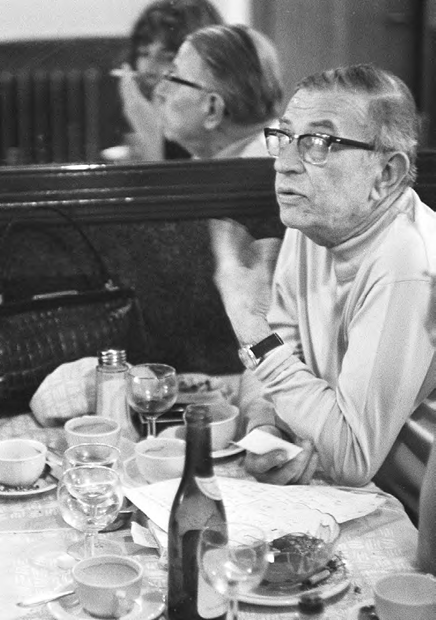
EXISTENTIALISM

Thomas Flynn


New York / London
www.sterlingpublishing.com
STERLING and the distinctive Sterling logo are registered trademarks of Sterling Publishing Co., Inc.
Library of Congress Cataloging-in-Publication Data
Flynn, Thomas R.
Existentialism / by Thomas Flynn.
p. cm.-- (A brief insight)
Originally published: Oxford; New York : Oxford University Press, 2006.
Includes bibliographical references.
ISBN 978-1-4027-6874-3 (alk. paper)
1. Existentialism. I. Title.
B819.F55 2009
142.78dc22
2009014192
10 9 8 7 6 5 4 3 2 1
Published by Sterling Publishing Co., Inc.
387 Park Avenue South, New York, NY 10016
Published by arrangement with Oxford University Press, Inc.
2006 Thomas Flynn
Illustrated edition published in 2009 by Sterling Publishing Co., Inc.
Additional text 2009 Sterling Publishing Co., Inc.
Distributed in Canada by Sterling Publishing
c/o Canadian Manda Group,
165 Dufferin Street Toronto, Ontario, Canada M6K 3H6
Book design: The DesignWorks Group
Book layout: Alexis Siroc
Please see picture credits on page 177 for image copyright information.
Manufactured in the United States of America
All rights reserved
Sterling ISBN 978-1-4027-6874-3
For information about custom editions, special sales, premium and corporate purchases, please contact Sterling Special Sales Department at 800-805-5489 or .
Frontispiece: Jean-Paul Sartre in Paris caf, May 27, 1970.
For Rose and Bob Flynn, Brady, Colin, and Alanna
EXISTENTIALISM IS COMMONLY associated with Left-Bank Parisian cafs and the family of philosophers Jean-Paul Sartre and Simone de Beauvoir who gathered there in the years immediately following the liberation of Paris at the end of World War II. One imagines offbeat, avant-garde intellectuals, attached to their cigarettes, listening to jazz as they hotly debate the implications of their newfound political and artistic liberty. The mood is one of enthusiasm, creativity, anguished self-analysis, and freedomalways freedom.
Though this reflects the image projected by the media of the day and doubtless captures the spirit of the time, it glosses over the philosophical significance of existentialist thought, packaging it as a cultural phenomenon of a certain historical period. That is perhaps the price paid by a manner of thinking so bent on doing philosophy concretely rather than in some abstract and timeless manner. The existentialists urge for contemporary relevance fired their social and political commitment. But it also linked them with the problems of their day and invited subsequent generations to view them as having the currency of yesterdays news.
Such is the misreading of existentialist thought that I hope to correct in this volume. If it bears the marks of its postwar appearance, existentialism as a manner of doing philosophy and a way of addressing the issues that matter in peoples lives is at least as old as philosophy itself. It is as current as the human condition which it examines. To ensure at the outset that this point is not lost, I begin my initial chapter with a discussion of philosophy, not as a doctrine or a system of thought but as a way of life. The title of comes from classical scholar Pierre Hadots study of the return to the Stoics as an example of how ancient philosophy can offer meaning to peoples lives even in our day. Though his preference is for the Greeks and Romans, Hadot finds a similar concern in the writings of Sren Kierkegaard and Friedrich Nietzsche, the so-called nineteenth-century fathers of the existentialist movement, and among their twentieth-century progeny.
It is commonly acknowledged that existentialism is a philosophy about the concrete individual. This is both its glory and its shame. In an age of mass communication and mass destruction, it is to its credit that existentialism defends the intrinsic value of what its main proponent Sartre calls the free organic individual, that is, the flesh-and-blood agent. Because of the almost irresistible pull toward conformity in modern society, what we shall call existential individuality is an achievement, and not a permanent one at that. We are born biological beings but we must become existential individuals by accepting responsibility for our actions. This is an application of Nietzsches advice to become what you are. Many people never do acknowledge such responsibility but rather flee their existential individuality into the comfort of the faceless crowd. As an object lesson in becoming an individual, in the following chapter, I trace what Kierkegaard calls spheres of or stages on lifes way and conclude with some observations about how Nietzsche would view this project of becoming an existential individual.
Shortly after the end of the war, Sartre delivered a public lecture entitled Is Existentialism a , I discuss the implications of that problematic lecture, the only one Sartre ever regretted publishing, as well as his contemporary Martin Heideggers response in his famous Letter on Humanism.
While the supreme value of existentialist thought is commonly acknowledged to be freedom, its primary virtue is is devoted to this topic as well as to the nature and forms of self-deception, or bad faith, that function as its contrary. I relate authenticity to existential individuality and consider the possibility of an ethics of authenticity based on existential responsibility.
In order to counter the criticism, widespread immediately after the war, that existentialism is simply another form of bourgeois individualism, bereft of collective consciousness and indifferent to the need to address the social issues of the day, I devote to the issue of a chastened individualism, as the existentialists try to conceive of social solidarity in a manner that will enhance rather than compromise individual freedom and responsibility, which remain nonnegotiable.
In the last chapter, I draw on the foregoing as well as on other aspects of existentialist thought to consider the continued relevance of existentialist philosophy in our day. It is necessary to separate the philosophical significance of the movement, its powerful insights, and its attention to the concrete, from the arresting but now dated trappings of its Left-Bank adolescence. From many likely candidates, I choose four topics of current interest to which the existentialists have something of philosophical import to say.
Two features of this brief volume may perhaps strike the reader as limitations even in an introduction: the number of commonly recognized existentialist names that are absent and, at the other extreme, the possibly excessive presence of Jean-Paul Sartre throughout the work. Regarding the first, though I could have mentioned, for example, Dostoevsky or Kafka, Giacometti or Picasso, Ionesco or Beckett, all powerful exemplars of existentialist themes in the arts, my concern is to treat existentialism as a philosophical movement with artistic implications rather than as (just) a literary movement with philosophical pretensionswhich is a common though misguided conception. The reason for not discussing Buber or Berdaiev, Ortega y Gasset or Unamuno, and many other philosophers deserving of mention here, is that this is an introduction, after all. Those interested in pursuing the topics discussed here will find suggestions of useful sources at the end of the book.
Font size:
Interval:
Bookmark:
Similar books «Existentialism»
Look at similar books to Existentialism. We have selected literature similar in name and meaning in the hope of providing readers with more options to find new, interesting, not yet read works.
Discussion, reviews of the book Existentialism and just readers' own opinions. Leave your comments, write what you think about the work, its meaning or the main characters. Specify what exactly you liked and what you didn't like, and why you think so.

